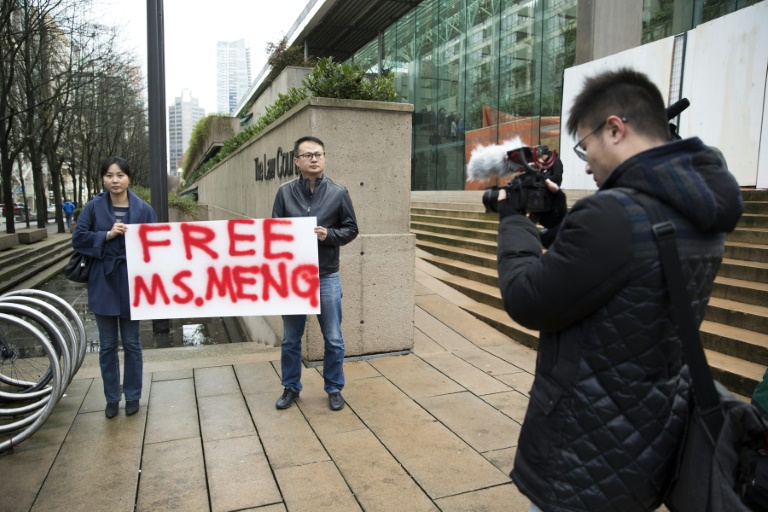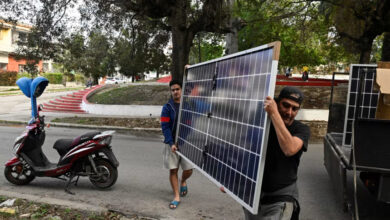
A top executive of Chinese telecom giant Huawei sought release from Canadian detention Monday, offering to submit to strict electronic monitoring, as Beijing escalates its protests over her arrest on a US warrant.
Meng Wanzhou, Huawei’s chief financial officer, faces US fraud charges related to alleged sanctions-breaking dealings with Iran, and has been awaiting a Canadian court’s bail decision — which after two days of hearings was put off until Tuesday.
She was detained in Vancouver on December 1 while changing planes during a trip from Hong Kong to Mexico, for possible extradition.
Her arrest has infuriated Beijing, rocking stock markets and raising tensions amid a truce in the US-China trade war.
Beijing’s latest outcry over the case also led to the suspension of a planned Canadian forestry trade mission to China this week.
Meng has agreed to surrender her passports and submit to electronic monitoring if she is released, pending the outcome of the extradition case.
“Given her unique profile as the face of a Chinese corporate national champion, if she were to flee or breach her order in any way in these very unique circumstances, it does not overstate to say she would embarrass China itself,” Meng’s lawyer David Martin told the court.
He had a tracking bracelet on hand in case she was immediately released.
In a 55-page sworn affidavit, Meng said she has been treated in hospital for hypertension since her arrest.
“I continue to feel unwell and I am worried about my health deteriorating while I am incarcerated,” the affidavit read.
Meng said she’d suffered numerous health problems, including surgery for thyroid cancer in 2011.
“I wish to remain in Vancouver to contest my extradition and I will contest the allegations at trial in the US if I am ultimately surrendered,” she said.
Ambassadors summoned
A Chinese vice foreign minister summoned the US and Canadian ambassadors over the weekend, demanding that the US withdraw its arrest warrant and warning Canada that it faces “grave consequences.”
Foreign ministry spokesman Lu Kang was critical of Meng’s treatment, citing China’s state-run Global Times newspaper as reporting that “it seems that the Canadian detention facility is not offering her the necessary health care.”
“We believe this is inhumane and violates her human rights,” Lu said at a regular press briefing.
Canadian Crown prosecutor John Gibb-Carsley has asked for bail to be denied, saying Meng faces serious criminal accusations of fraud and poses a flight risk.
“Underneath the core of the fraud, a financial institution in the US is being induced to violate sanctions against Iran,” Gibb-Carsley said.
Meng is specifically accused of lying to bankers about the use of a covert subsidiary to sell to Iran in breach of sanctions.
If convicted, she faces more than 30 years in prison. The extradition process could take months, even years, if appeals are made in the case.
Trade talks
Meng said she has ties to Vancouver going back 15 years. She and her husband Liu Xiaozong own two homes in the city, and she even had a Canadian permanent residency permit that she has since renounced.
Liu, who was at the hearing, has offered the residences and Can$1 million in cash — for a total value of Can$15 million — as a surety for his wife’s release, the court heard.
Police were reportedly called to one of the houses, in Vancouver’s Dunbar neighborhood where she proposes to stay, about a possible break-in early Sunday.
Analysts say Meng’s arrest — the same day that presidents Donald Trump and Xi Jinping agreed to a 90-day tariffs truce — could be used as a bargaining chip in trade negotiations between the United States and China.
But US Trade Representative Robert Lighthizer rejected suggestions that the case could affect the talks while Canadian Prime Minister Justin Trudeau has said politics played no part in the decision to arrest Meng.
In a sign that the row has not derailed the truce, top Chinese and US negotiators held telephone talks on Tuesday to discuss the timetable of trade talks, the Chinese commerce ministry said.
The ministry said in a statement that Vice Premier Liu He spoke with US Treasury Secretary Steven Mnuchin and US Trade Representative Robert Lighthizer.
The two sides “exchanged views on the implementation of the consensus” reached by Trump and Xi as well as the timetable for the next round of negotiations, it said, without offering more details.
Huawei’s affordable smartphones have made strong inroads in the developing world, but the company has faced repeated setbacks in major Western economies over security concerns.
Also the world’s largest telecommunications equipment maker, Huawei faces being shut out of Australia, New Zealand and US 5G rollouts, and British telecom group BT revealed last Wednesday it was removing Huawei equipment from its core cellular network.




